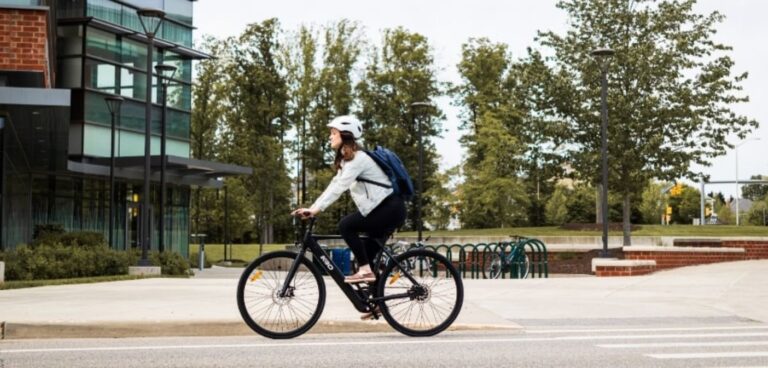Cycling, especially with e-bikes, will play a major role in reaching a net zero future, according to a recent report from the Bike Storage Company.
The report, titled The Role of E-Bikes in Decarbonising Transportation, covers some the UK’s ambitions and the role that cycling will play in reaching environmental targets.
It cites UK government commitments to cycling, including an investment of £2bn over five years, with the aim that over half of all journeys in towns or cities will be walked by 2030.
This is alongside a commitment to deliver a “world-class cycling and walking network” by 2040.
The Bike Storage company claims that increased cycling and walking could save 0.9-5.5 tonnes of CO2 from 2020 to 2050 and produce £20-100m worth of air quality benefits by 2050.
The government’s Cycling and Walking Investment Strategy set out a target to double cycling by 2025. This initially seemed unrealistic, especially after the arrival of the coronavirus pandemic.
Surprisingly, cycling rose by 46% in 2020. This increase was greater than across the whole of the previous 20 years and the biggest growth in post-war history.
This unprecedented uptake revealed opportunities for cycling and walking as viable commute options for people across the country.
To support this, the Bicycle Association of Great Britain revealed that April 2022 saw at least a 50% increase in sales across the whole cycling market.
The Bike Storage Company released a league table of UK cities leading the way in cycle commutes.
Bristol maintained a steady lead, with 28.9 cycling commuters per 1,000 people, followed by Newcastle with 20.8. London ranked 6th on the list, with 11.9 commuters per 1,000.
E-bikes will play a particularly important role in a decarbonised future, according to the report, which suggests that appetite for the switch is growing.
According to Halfords, there was a 47% increase in e-bike searches in 2020 throughout the UK.
Furthermore, £1 in every five spent on bicycles between January and October 2020 was spent on e-bikes.
Craig Bennett, Friends of the Earth chief executive, said: “By getting more people out of their cars, we can look to a future where our towns and cities are not choking on polluted air, and climate-wrecking emissions have been slashed.”
The report also considers cycling’s manufacturing impact. According to Trek’s sustainability report for 2021, a bike’s carbon footprint can be substantially mitigated or entirely offset.
The European Cycling Federation (ECF) said the manufacturing footprint of bicycles is 96kg of carbon dioxide equivalent (CO2e), whereas e-bike production creates 134kg CO2e.
According to Trek, the production of an entry-level mountain bike emits about 100kg of CO2e, as opposed to 165kg for a Trek e-bike.
Both figures are still far lower than the 5.5 tonnes of CO2e reportedly needed to produce one small hatchback, let alone the 13 tonnes needed for some SUVs.
The Bike Storage Company’s report concludes that e-bikes will be critical to a more sustainable future, providing a realistic, sustainable alternative for people who find it difficult to regularly ride an unassisted bike.





